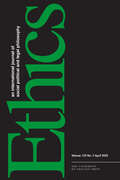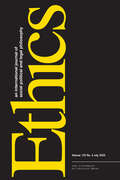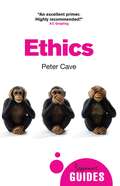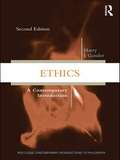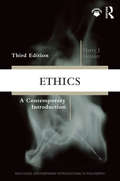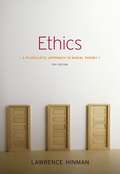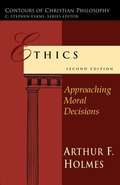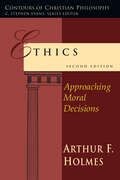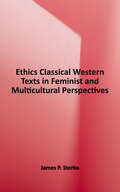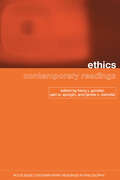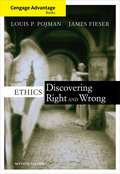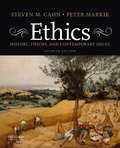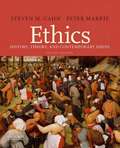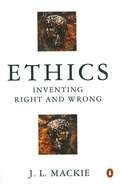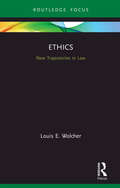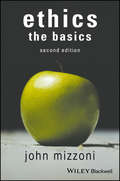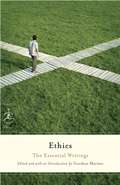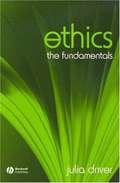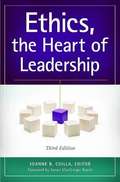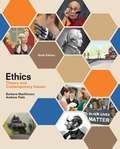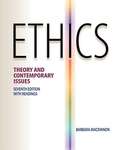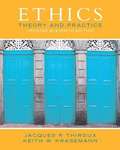- Table View
- List View
Ethics, volume 135 number 3 (April 2025)
by EthicsThis is volume 135 issue 3 of Ethics. Ethics features scholarly work that covers a range of topics pertaining to moral, political, and legal philosophy from a variety of intellectual perspectives, including social and political theory, law, and economics. Articles in the journal present new theories, apply theory to contemporary moral issues, and focus on historical works that have significant implications for contemporary theory. In addition to major articles, Ethics publishes critical discussions, symposia, review essays, and book reviews.
Ethics, volume 135 number 4 (July 2025)
by EthicsThis is volume 135 issue 4 of Ethics. Ethics features scholarly work that covers a range of topics pertaining to moral, political, and legal philosophy from a variety of intellectual perspectives, including social and political theory, law, and economics. Articles in the journal present new theories, apply theory to contemporary moral issues, and focus on historical works that have significant implications for contemporary theory. In addition to major articles, Ethics publishes critical discussions, symposia, review essays, and book reviews.
Ethics: A Beginner's Guide (Beginner's Guides)
by Peter CaveFrom Confucianism to Kant's categorical imperative, from the Ancient Greeks to Amnesty International, This essential volume presents ethics through a fascinating global historical lens and relates it to everyday life and 21st-century politics. Peter Cave traces the development of this key branch of philosophy up to the present day, introducing readers to all the main schools of thought. With his characteristic wit and clarity, Cave takes on good and evil, power and politics, and liberalism and relativism, and handily guides us around some of the most common potholes in ethical reasoning. Applying theory to contemporary concepts like corporate social responsibility and bioethical issues such as so-called designer babies, this is an indispensable primer on the subject.
Ethics: A Contemporary Introduction
by Harry J GenslerHarry Gensler's Ethics introduces undergraduates to the main issues in contemporary moral philosophy. It also relates these issues to practical controversies, with special attention paid to racism, moral education, and abortion. It gives a practical method for thinking about moral issues, a method based largely on the golden rule. Key Features:* Serves as either the sole textbook for a lower-level introduction to ethics/moral philosophy course or a supplementary text for a more advanced undergraduate ethics course* Provides clear, direct writing throughout, making each chapter easily accessible for an engaged undergraduate* Offers a philosophically rigorous presentation of the golden rule* Includes helpful study aids, including: bolded technical terms, boxes for key ideas, chapter summaries, suggested readings, and a glossary/index Key additions to the Second Edition:* A new chapter on virtue ethics, which deals with Aristotle, Plato, and related controversies* A new chapter on natural law theory, which deals with Aquinas, double effect, sexual morality, and related controversies* A significantly revised chapter on the golden rule, which is now much clearer on certain key points* A significantly revised chapter on nonconsequentialism, which now has expanded coverage of human rights, libertarianism, and socialism, and uses the right to health care as a case example* An expanded bibliography* A new appendix that overviews key books students will want to pursue upon completing Ethics: A Contemporary Introduction, Second Edition* A rewritten instructional program, EthiCola, which is now much easier to download and use and has (for students) revised exercises for each chapter and (for instructors) a score-processing program, class slides, and instructor's manual. This can be found on the book's companion website: http://www.routledge.com/textbooks/gensler.
Ethics: A Contemporary Introduction (Routledge Contemporary Introductions to Philosophy)
by Harry J GenslerEthics: A Contemporary Introduction introduces the issues and controversies of contemporary moral philosophy. It gets students to struggle with the big questions of morality while it also relates these questions to practical issues, especially racism, global warming, moral education, and abortion. Providing a practical method for thinking about moral issues—a method based largely on the golden rule—it is written simply and clearly throughout. College students who are new to philosophy or who have already taken an introductory-level course will benefit from its use. Key Features: Serves as either the sole textbook for a lower-level introduction to ethics/moral philosophy course or a supplementary text for a more advanced undergraduate ethics course. Provides clear, direct writing throughout, making each chapter easily accessible for an engaged undergraduate student. Offers a philosophically rigorous presentation of the golden rule. Includes helpful study aids, including: bolded technical terms; boxes for key ideas; summaries, study questions, and suggested readings for each chapter; and a comprehensive glossary/index at the back of the book. Key Additions to the Third Edition: Each chapter now offers additional, optional sections on more advanced topics for students wishing to dig deeper into the material (advanced topics include: Kohlberg’s moral psychology, whether morality is gendered, types of relativism, early Greek ethics, Hume, and the prisoner’s dilemma). Other improvements include: better chapter organization, clearer explanations, improved examples, new names for key arguments, and a better Kindle version. An updated and improved EthiCola instructional program (with a score-processing program, teacher’s manual, and class slides), which can be downloaded from the web for free (from www.harrycola.com/ec or www.harryhiker.com/ec).
Ethics: A Pluralistic Approach To Moral Theory, 5th Edition
by Lawrence M. HinmanETHICS: A PLURALISTIC APPROACH TO MORAL THEORY, FIFTH EDITION provides a comprehensive yet clear introduction to the main traditions in ethical thought, including virtue ethics, utilitarianism, and deontology. Additionally, the book presents a conceptual framework of ethical pluralism to help readers understand the relationship among various theories. Lawrence Hinman, one of the most respected and accomplished professionals in ethics and philosophy education today, presents a text that gives readers plentiful opportunities to explore ethical theory and their own responses to them, using fascinating features such as the "Ethical Inventory" sections that appear at the beginning and the end of the text. End-of-chapter discussion questions, and the use of current issues and movies help students retain what they've learn and truly comprehend the subject matter.
Ethics: Approaching Moral Decisions (2nd Edition)
by Arthur F. HolmesWith over 60,000 copies in print since its original publication in 1984, Ethics has served numerous generations of students as a classic introduction to philosophical ethics from a Christian perspective. Over the years the philosophical landscape has changed somewhat, and in this second edition Arthur Holmes adjusts the argument and information throughout, completely rewriting the original chapter on virtue ethics and adding a new chapter on the moral agent. Holmes addresses the questions: What is good? What is right? How can we know? In doing so he also surveys a variety of approaches to ethics, including cultural relativism, emotivism, ethical egoism and utilitarianism--all with an acknowledgment of the new postmodern environment.
Ethics: Bullet Guides
by Robert AndersonOpen this book and you will Understand morals Discover freedom Meet key figures Apply ethics
Ethics: Bullet Guides
by Robert AndersonOpen this book and you will Understand morals Discover freedom Meet key figures Apply ethics
Ethics: Classical Western Texts in Feminist and Multicultural Perspectives
by James P. SterbaEthics: Classical Western Texts in Feminist and Multicultural Perspectives offers students a unique introduction to ethics by integrating the historical development of Western moral philosophy with both feminist and multicultural approaches. Engaging and accessible, it provides an introductory sampling of several of the classical works of the Western tradition in ethics and then situates these readings within feminist and multicultural perspectives to better understand and evaluate them in our contemporary environment. While some of the non-Western works parallel the views defended in the Western works (e.g., Confucius's work echoes that of Plato or Aristotle), others question the Western perspectives (e.g., American Indian works provide an interesting challenge to Western moral philosophy). Confucius, Jorge Valadez, Ward Churchill, Moshoeshoe II, and Eagle Man present multicultural perspectives to the works of Plato, Aristotle, Hume, Kant, Nietzsche, Sartre, Rawls, MacIntyre, Korsgaard, and others. Noted feminists Christine de Pizan, Simone de Beauvoir, Carol Gilligan, Annette Baier, Susan Okin, and Rosemarie Radford Ruether also offer alternative views. Ideal for courses in introduction to ethics, history of ethics, and feminist ethics, the book is also intriguing reading for interested general readers.
Ethics: Contemporary Readings (Routledge Contemporary Readings in Philosophy)
by Harry J. Gensler Earl W. Spurgin James C. SwindalEthics: Contemporary Readings is designed to lead any student into the subject, through carefully selected classic and contemporary articles. The book includes articles by the leading figures in the field and provides an excellent entry to the topic. The book complements Harry Gensler's Ethics: A Contemporary Introduction (Routledge, 1998).
Ethics: Discovering Right And Wrong
by Louis P. Pojman James FieserStudy ethics from a classic ethics text, written by one of contemporary philosophy's most skilled teachers, Louis P. Pojman, now revised by best-selling author and editor of the INTERNET ENCYCLOPEDIA OF PHILOSOPHY, James Fieser. ETHICS: DISCOVERING RIGHT AND WRONG, Seventh Edition, offers a concise yet comprehensive overview of the fundamental objectives and outlooks of ethical theory. Written with Pojman's hallmark engaging, conversational manner with strong supporting pedagogy, this book challenges students to develop their own moral theories and to reason through ethical problems for themselves. The text even-handedly raises critical questions and fosters independent thinking within a rigorous presentation that draws numerous examples from both classical and contemporary sources. This edition maintains the text's clarity and strengths with its non-dogmatic style and generous presentation of various positions. This revision includes more feminist and multicultural ethical perspectives.
Ethics: History, Theory, And Contemporary Issues
by Steven M. Cahn Peter MarkieEthics: History, Theory, and Contemporary Issues, Fifth Edition, features sixty-nine selections organized into three parts, providing instructors with great flexibility in designing and teaching a variety of courses in moral philosophy. Spanning 2,500 years of ethical theory, the first part,Historical Sources, ranges from ancient Greece to the twentieth century. It moves from classical thought through medieval views to modern theories, culminating with leading nineteenth- and twentieth-century thinkers. The second part, Modern Ethical Theory, includes many of the most important essaysof the past century. The discussion of utilitarianism, Kantianism, egoism, and relativism continues in the work of major contemporary philosophers, while landmark selections reflect concern with moral language and the justification of morality. The concepts of duty, justice, and rights are explored,as well as recent views on cultural relativism and an ethic influenced by feminist concerns. In the third part, Contemporary Moral Problems, the readings present the current debates over abortion, euthanasia, famine relief, animal rights, environmentalism, and the use of torture in interrogations,as well as essays on death and the meaning of life. Wherever possible, each reading is printed in its entirety.The fifth edition features new readings from Cicero, Barbara Herman, and Judith Jarvis Thomson; an expanded selection from Joseph Butler's Fifteen Sermons; and a new translation of Kant's Groundwork for the Metaphysics of Morals. In addition, the book is supplemented for the first time by a robustsupport package. An Instructor's Resource CD contains reading summaries, essay questions, multiple-choice and true/false questions, PowerPoint-based lecture outlines, and relevant website links. A Companion Website at www.oup/us/cahn provides most of the material from the Instructor's Resource CDalong with student resources including interactive self-quizzes, questions for discussion, and helpful links.
Ethics: History, Theory, and Contemporary Issues, Sixth Edition
by Steven M. Cahn Peter MarkieEthics: History, Theory, and Contemporary Issues, Sixth Edition, features fifty-nine selections organized into three parts, providing instructors with great flexibility in designing and teaching a variety of courses in moral philosophy. Spanning 2,500 years of ethical theory, the first part, Historical Sources, ranges from ancient Greece to the twentieth century and now includes the complete text of John Dewey's Theory of Valuation. The second part, Modern Ethical Theory, includes many of the most important essays of the past century. The discussion of varieties of normative ethics continues in the work of major contemporary philosophers, while landmark selections reflect concern with moral language and the justification of morality. In the third part, Contemporary Moral Problems, the readings present the current debates over abortion, euthanasia, famine relief, environmentalism, and the use of torture in interrogations, as well as essays on the trolley problem, death, and the meaning of life. One-third of the selections are authored by women. Wherever possible, each reading is printed in its entirety.
Ethics: Inventing Right and Wrong
by J. L. MackieThis title presents an insight into moral skepticism of the 20th century. The author argues that our every-day moral codes are an 'error theory' based on the presumption of moral facts which, he persuasively argues, don't exist.
Ethics: Inventing Right and Wrong
by J.L. MackieAn insight into moral skepticism of the 20th century. The author argues that our every-day moral codes are an 'error theory' based on the presumption of moral facts which, he persuasively argues, don't exist. His refutation of such facts is based on their metaphysical 'queerness' and the observation of cultural relativity.
Ethics: New Trajectories in Law (New Trajectories in Law)
by Louis E. WolcherThis book examines ethics at the intersection of law and justice. If law and justice are concerned with collectively establishing the general terms on which the plurality called "we" share the earth as social beings, then ethics concerns the individual Self’s particular moral relationship with the Other. Law, the acknowledged offspring of politics, represents the kind of might that most people accept as legitimate, at least most of the time. Justice, on the other hand, is supposed to vigilantly stand guard over law: to protect us against its biases and excesses, or, at the very least, to rise up and reproach the law whenever it permits or encourages injustice. But what if the belief that a particular legally-authorized state of affairs is "just" – a common enough feeling, especially amongst the privileged – or even "unjust" and in need of correction, were itself in need of a vigilant guardian? This book argues that ethics can and should stand guard over whatever image of justice and/or just law one happens to believe in. The book thus attempts to steer a perilous course between two looming moral hazards: ethics interpreted as the rational production of ethically correct behavior (as in Kant) and ethics interpreted as the spontaneous eruption of pre-rational compassion for the suffering of the Other, come what may (as in Levinas). In the end, the book characterizes ethical life in the law as the more-or-less constant experience of the paradoxical nature of this choice – a feeling of inescapable personal responsibility for the fate of the Other. Based on the author’s well-established expertise in the area, this book will appeal to students, scholars and others with interests in legal theory and moral and political philosophy.
Ethics: The Basics, 2nd Edition
by John MizzoniUpdated and revised, Ethics: The Basics, Second Edition, introduces students to fundamental ethical concepts, principles, theories, and traditions while providing them with the conceptual tools necessary to think critically about ethical issues. Introduces students to core philosophical problems in ethics in a uniquely reader-friendly manner Lays out clearly and simply a rich collection of ethical concepts, principles, theories, and traditions that are prevalent in today’s society Considers western and non-western viewpoints and religious interpretations of ethical principles Offers a framework for students to think about and navigate through an array of philosophical questions about ethics
Ethics: The Essential Writings (Modern Library Classics)
by Gordon MarinoIn Ethics: The Essential Writings, philosopher Gordon Marino skillfully presents an accessible, provocative anthology of both ancient and modern classics on matters moral. The philosophers represent 2,500 years of thought--from Plato, Kant, and Nietzsche to Alasdair MacIntyre, Susan Wolf, and Peter Singer--and cover a broad range of topics, from the timeless questions of justice, morality, and faith to the hot-button concerns of today, such as animal rights, our duties to the environment, and gender issues. Featuring an illuminating preamble, concise introductory essays on the giants of ethical theory, and incisive chapter headnotes to the modern offerings, this Modern Library edition is a perfect single-volume reference for students, teachers, and anyone eager to engage in reflection on ethical questions, including "What is the basis for our ethical views and judgments?" Gordon Marino is professor of philosophy and director of the Hong Kierkegaard Library at St. Olaf College in Northfield, Minnesota. A recipient of the Richard J. Davis Ethics Award for excellence in writing on ethics and the law, he is the author of Kierkegaard in the Present Age, co-editor of The Cambridge Companion to Kierkegaard, and editor of the Modern Library's Basic Writings of Existentialism. His essays have appeared in The New York Times.From the Trade Paperback edition.
Ethics: The Fundamentals (Fundamentals of Philosophy Series)
by Julia DriverEthics: The Fundamentals explores core ideas and arguments in moral theory by introducing students to different philosophical approaches to ethics, including virtue ethics, Kantian ethics, divine command theory, and feminist ethics. The first volume in the new Fundamentals of Philosophy series. Presents lively, real-world examples and thoughtful discussion of key moral philosophers and their ideas. Constitutes an excellent resource for readers coming to the subject of ethics for the first time.
Ethics: The Heart of Leadership
by Joanne B. CiullaTop academic scholars ponder the question of ethics as it pertains to all aspects of leadership in business, government, and nonprofit organizations. * Includes contributions from philosophers, management theorists, and industrial and organizational psychologists * Reveals the roles that deception and self-deception play in exercising power * Explains complex management models in easy-to-understand, accessible language * Examines leadership across a variety of industries
Ethics: Theory and Contemporary Issues
by Andrew Fiala Barbara MacKinnonExplore the major perspectives in ethical theory and contemporary moral debates using ETHICS: THEORY AND CONTEMPORARY ISSUES, 9th Edition. Overviews and a selection of readings from traditional and contemporary sources make complex philosophical concepts reader-friendly. Comprehensive introductions to general and specific areas of ethical debate cover such influential ethical theories as religion and global ethics, utilitarianism and deontology, natural law ethics, and feminist and care ethics. Contemporary moral issues include euthanasia, sexual morality, economic justice, war, violence, globalization, structural racism, and same-sex marriage. MindTap offers assessments along with animated ethics simulations that allow you to engage with the philosophical issues and concepts discussed in the text.
Ethics: Theory and Contemporary Issues (7th Edition)
by Barbara MackinnonClosely examine the major areas of ethical theory as well as a broad range of contemporary moral debates using MacKinnon's acclaimed Ethics: Theory and Contemporary Issues, Seventh Edition. Illuminating overviews and a selection of readings from both traditional and contemporary sources make even complex philosophical concepts reader friendly. Comprehensive, clear-sighted introductions to general and specific areas of ethical debate cover major ethical theories, including feminist ethics, contract theory, and ethical relativism, before delving into issues ranging from euthanasia and sexual morality to war and globalization. A broader range of voices and philosophical traditions in this edition includes continental and non-Western philosophers, with new readings from prominent ethicists. Increased coverage of contemporary dilemmas highlights issues of widespread interest, including torture and terrorism, "partial birth" abortion, cloning, same-sex marriage, and global distributive justice. An innovative online resource center offers, among other things, animated simulations. These simulations allows you to personally engage with dilemmas and thought experiments commonly presented in introduction to ethics classes and provide instructors with a way to seamlessly integrate online assignments into the class.
Ethics: Theory and Practice
by Jacques P. Thiroux Keith W. KrasemannWith a clear presentation, Ethics: Theory and Practice educates readers about ethical theory and applies concepts to classic and contemporary moral problems (lying, cheating, establishing ethical business practices, honoring ethical obligations in medicine, etc. ). This title educates readers about ethical theory and its applications in a way that beginning students can understand. Ethics is neither technical nor does it plunge readers into complex readings without sufficient background. This title is fully updated with global issues and non-Western ethical views. Besides updating the foundations of the book, the author incorporates new and relevant material, most of which is often unique only to this title.
